| Part of a series on the |
| Wildlife of Great Britain |
|---|
 |
This is a list of amphibians of Great Britain. There are seven amphibian species native to Great Britain, in addition, there are a number of naturalized species. The natives comprise three newts, two toads and four frogs. All native species are least concern.
Native species
Pleurodelinae
| Image | Name | Larva |
|---|---|---|
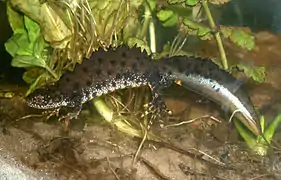 |
Great crested newt (Triturus cristatus) | 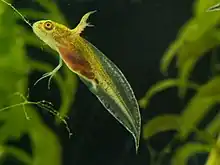 |
_(8619564348).jpg.webp) |
Smooth newt (Lissotriton vulgaris) | _nymph.jpg.webp) |
%252C_Fagne_de_la_Petite_Roer%252C_Sourbodt%252C_Ostbelgien_(48972546703).jpg.webp) |
Palmate newt (Lissotriton helveticus) |  |
Bufonidae
| Image | Name | Tadpole |
|---|---|---|
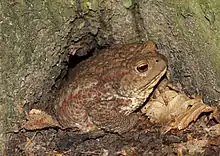 |
Common toad (Bufo bufo) | 2.jpg.webp) |
 |
Spiny toad (Bufo spinosus) – Jersey | |
_(40768303714).jpg.webp) |
Natterjack toad (Epidalea calamita) | 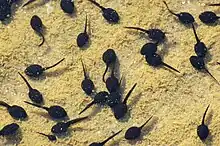 |
Ranidae
| Image | Name | Tadpole / froglet |
|---|---|---|
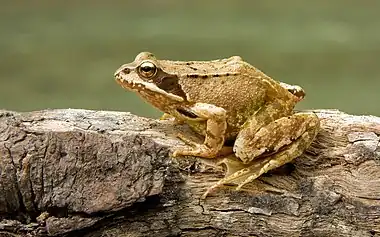 |
Common frog (Rana temporaria) | 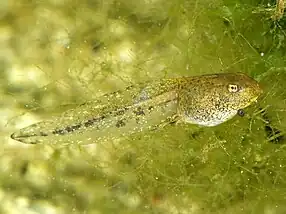 |
 |
Pool frog (Pelophylax lessonae) | |
 |
Moor frog (Rana arvalis) |  |
_Female_closeup.jpg.webp) |
Agile frog (Rana dalmatina) – Jersey |  |
Naturalised and escaped species
- Salamanders and newts
- Fire salamander (Salamandra salamandra) — has bred at least once
- Alpine newt (Ichthyosaura alpestris) (naturalised)[1]
- Italian crested newt (Triturus carnifex)[2]
- Toads
- Midwife toad (Alytes obstetricans) (naturalised)[3]
- Yellow-bellied toad (Bombina variegata) — was naturalised but current status unknown.[4]
- Frogs
- Painted frog (Discoglossus pictus) — has bred at least once
- European tree frog (Hyla arborea)[5]
- Australian green tree frog (Litoria caerulea) — has bred at least once
- Marsh frog (Pelophylax ridibundus) (naturalised)[6]
- Edible frog (Pelophylax kl. esculentus) (naturalised)[7]
- Iberian water frog (Pelophylax perezi) – has bred[8]
- American bullfrog (Lithobates catesbeiana) — successfully bred[9]
- African clawed toad (Xenopus laevis) — two populations survived in the UK for 50 years, now extinct apart from in Calderstones Park.[10]
References
- ↑ "Alpine newt". Lothian Amphibian and Reptile Group. Retrieved 27 February 2017.
- ↑ Inns, Howard (2009). Britain's reptiles and amphibians. Old Basing: WILDGuides. p. 146. ISBN 978-190365725-6.
- ↑ "Alytes obstetricans: midwife toad". AmphibiaWeb. 2021. Retrieved 1 September 2021.
- ↑ Sergius Kuzmin, Mathieu Denoël, Brandon Anthony, Franco Andreone, Benedikt Schmidt, Agnieszka Ogrodowczyk, Maria Ogielska, Milan Vogrin, Dan Cogalniceanu, Tibor Kovács, István Kiss, Miklós Puky, Judit Vörös, David Tarkhnishvili, Natalia Ananjeva (2009). "Bombina variegata". IUCN Red List of Threatened Species. 2009: e.T54451A11148290. doi:10.2305/IUCN.UK.2009.RLTS.T54451A11148290.en. Retrieved 1 September 2021.
{{cite journal}}: CS1 maint: multiple names: authors list (link) - ↑ "Hyla arborea: common tree frog". AmphibiaWeb. 2010. Retrieved 2 December 2010.
- ↑ "Pelophylax ridibundus: marsh frog". AmphibiaWeb. 2007. Retrieved 1 September 2021.
- ↑ "Pelophylax esculentus: edible frog". AmphibiaWeb. 1999. Retrieved 1 September 2021.
- ↑ ARC (nd). Alien amphibian and reptile species in the UK. Bournemouth: Amphibian and Reptile Conservation.
- ↑ "American Bull Frog". Froglife. Retrieved 28 April 2017.
- ↑ Tinsley, Richard C.; Stott, Lucy C.; Viney, Mark E.; Mable, Barbara K.; Tinsley, Matthew C. (2015). "Extinction of an introduced warm-climate alien species, Xenopus laevis, by extreme weather events". Biological Invasions. 17 (11): 3183–3195. doi:10.1007/s10530-015-0944-x. PMC 4581400. PMID 26430383.
This article is issued from Wikipedia. The text is licensed under Creative Commons - Attribution - Sharealike. Additional terms may apply for the media files.